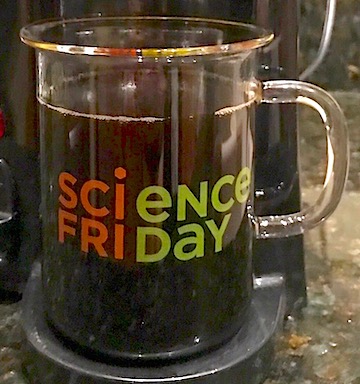A brief post about how you can learn things every day with podcasts.

Planet Money is just one of the podcasts I listen to regularly.
I’ve been listening to podcasts for more than 10 years now. In fact, I had my own podcast — which was mostly an audio version of some of my blog posts — from 2005 to 2007. I believe that podcasts are a great use of downtime to learn new things.
(If you’re not interested in learning new things, you may as well stop reading now and resume your perusal of cat videos and other entertaining but frivolous nonsense that clogs the Internet’s “pipes.” I’m not even sure why you came to this blog, since it exists primarily to share the things I’ve learned and encourage informed, educated conversation among readers.)
If you’re not sure why you should be interested in learning new things, consider this:
Learning new things helps make you a more rounded person, able to have a good conversation with just about anyone. It helps you make better decisions for yourself, your career, and your family. It keeps you informed about the things that affect the world around you so you can better understand them without relying on someone with an agenda to explain them to you.
Such as the Jones Act, which has been in the news all week.
I’d never heard of the Jones Act before I learned about it on a Planet Money podcast. Originally aired back in 2014, it explains what the Jones Act is and what it means to real people.
What I like about Planet Money is that it covers topics related to economics in plain English. It’s not just informative — its entertaining. When I heard the Jones Act mentioned in the news this morning, I immediately remembered the family that missed their cruise ship departure and how Jones Act penalties cost them money. It was easy to understand how this law from the 1920s, written to create a sort of monopoly for American shippers, could negatively impact Americans in Puerto Rico who lacked basics like drinking water right after Hurricane Maria. Knowing about the Jones Act gave me a sort of leg up on this week’s conversations about it.
That’s just an example, of course. I listen to a handful of podcasts, some for education and others for entertainment. They fill my head with sometimes trivial yet often fascinating information that makes me think. They challenge me with puzzles and word games and news quizzes. They make me laugh and cry. They’re a great use of my downtime, no matter where I am; I can carry them around with me on my phone, along with the music I find myself listening to less and less frequently.
Here’s what’s currently in my preferred podcast app, Downcast:
-

I bought a SciFri beaker mug to help support the Science Friday radio show and podcast. I made coffee in it this morning for the first time. - Freakonomics Radio
- The Inspired Pilot Podcast
- Marketplace Tech
- On the Media
- Planet Money
- Science Friday
- The Sporkful
- Wait Wait…Don’t Tell Me!
By “downtime,” I mean the time I spend doing something that requires some but not all of my concentration. Driving is a perfect example. I need to pay attention to the road and signs and other drivers while I’m driving, but that doesn’t prevent me from having a conversation with a companion or listening to music or audio books. Long solo drives — perhaps a daily commute — is a perfect time to listen to podcasts.
I don’t have much of a commute, although I do listen to short podcasts on my drive from home into town (20-30 minutes) to run errands once in a while. I mostly listen when I’m traveling — on a very long drive or stuck in an airplane. Or even flying my helicopter from point A to B. (These are the same times I sometimes listen to audio books, which are available from my library for free.) This is time when I really can’t do anything else. It’s nice to let my mind wander sometimes, but it’s also good to make use of this time to learn.
Do you listen to podcasts? If so, what are your favorites? Use the comments for this post to let readers — and me! — know.

I listened to that NPR Jones Act podcast about US protectionism with great interest. What a monumental scam! Thanks for the link.
And yes, I listen to radio and radio podcasts far more than I watch TV. The pictures are far better on the radio, if you get my drift.
My favourite station is the BBC World Service, and despite Britain’s dwindling power and influence, the BBC World Service remains the world’s most trusted source of news and factual broadcasting. I can get it in Boston, California and Whitehorse, Yukon.
It is ad-free in the UK and is put together by people who are not paid by shallow despots to sing their praises. That’s rare these days.
If a Somali wants to know the latest news from the Yemen, he/she will listen to the BBC WS.
If you listen to the BBC you will find that South Korea is still sending food aid to North Korea, despite recent threats of war.
I listen to BBC World Service, mostly in the morning before NPR starts its broadcast day with Morning Edition. A version of it also plays midday as part of PRI’s The World show. Good to hear the news from a different point of view.
I know exactly what you mean about the pictures being better on radio. I also listen to the radio and podcasts much more than I watch TV.
I’ve been listening to Quirks and Quarks, http://cbc.ca/quirks , for years now and it’s my absolute favourite. Science topics with a brilliant host. I listen while cooking.
Thanks for this. I’ll give it a try. I like science podcasts, as long as they’re light on biomed stuff.